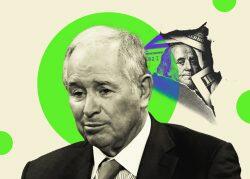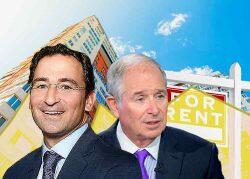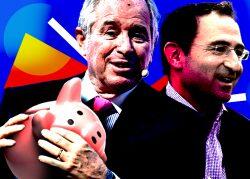Rising interest rates, inflation and geopolitical unrest are bearing down on Blackstone’s earnings.
The investment giant on Thursday reported virtually no net income — $2.3 million or less than 1 cent a share — in the third quarter, after raking in $1.4 billion or $1.94 per share in the same quarter last year.
Meanwhile, distributable earnings — the cash divvied out to shareholders — slipped to $1.4 billion, a 12.5 percent decline from $1.6 billion in the same period last year, as the firm struggled to offload assets.
CEO Stephen Schwarzman addressed the falling metrics at the top of Blackstone’s earnings call Thursday, acknowledging that macroeconomic stressors have “created an extremely difficult environment for investors to navigate.”
“It’s just inevitable when you take the cost of capital from 0 percent to 4 percent,” said Jonathan Gray, the chief operating officer. “People start to think about deleveraging, paying down their debt. They’re less focused on expansion.”
As a result, the firm struggled to divest enough assets to buoy profits. Real estate was a big part of that.
Read more



Net realizations portfolio-wide fell 61 percent to $402.6 million in the quarter, compared with $1 billion in the same period of 2021. Real estate realizations fell about $155 million, down 54 percent from last year’s $339 million.
The firm also reported the value of its opportunistic real estate fund — the riskiest investments with the least predictable cash flows — fell 0.6 percent in the quarter. Only the firm’s private equity funds performed worse.
“Why is real estate still an interesting place?” Goldman Sachs senior analyst Alexander Blostein asked on the call.
Blackstone executives replied by citing the strength of its core holdings for at least the third time during the session. The overwhelming majority of the firm’s real estate portfolio is in logistics and rental housing, sectors where rents are growing above the rate of inflation.
Nationally, residential rents are still growing year-over-year, though the pace of those gains has slowed. Meanwhile, Blackstone’s COO said industrial spaces can still fetch 30 percent rent hikes.
The value of the firm’s Core+ investments, properties with high-quality tenants, grew 2.3 percent in the period, in line with second-quarter gains, but down from the 7.6 percent growth reported in the third quarter of 2021.
Gray added that inflation and labor shortages are likely to curb construction of rental units. That reduction in supply may continue to push rents up, a silver lining for the investment giant.
“Unlike almost every other down cycle, what we have going into this, particularly in rental housing, is low rates of vacancy, limited supply and a lot less leverage,” Gray said.
“So I think long-term assets in real estate, which is obviously a big area of focus for us, is a really good area to be in,” the COO concluded.
